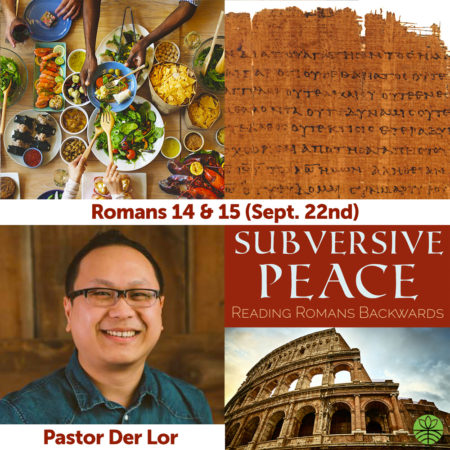Sermons on Culture (Page 2)
Temptations
In the Gospel according to Luke, Jesus is led by the Spirit into the wilderness. There he confronts the devil and resists three temptations. These three temptations aren’t just instructive for us personally, they also describe perennial temptations the church faces in relationship to society. They are: 1. Empire Economics; 2. Idolatrous Nationalism; and 3. Blasphemous Religion.
Paul’s Rhetorical Trap
In Romans 1.18–32, Paul employs language that echoes common Jewish stereotypes of Gentiles as particularly depraved and deserving of God’s wrath. Examples of this rhetoric can be found in Wisdom of Solomon. But Paul uses this rhetoric not to reinforce division between the Jewish and Gentile disciples in Rome. No! Paul uses it as a rhetorical trap to expose prejudice and teach against judgment.
Privilege Displaced
Romans chapter 9 has been misunderstood as a passage about individual election, predestination, and personal salvation. But Romans is not a book of abstract, systematic theology. Romans is a pastoral letter written to a church with factions along cultural and ethnic lines. Paul is writing to the so-called “Weak” and “Strong” to reframe the stories they’ve been living in. Privilege was an key part of what was driving these groups apart, dividing the Body of Christ. Today in the U.S.,…
Christoformity, Glory, Hope
These three words, Christoformity, Glory, and Hope, represent the basic arch of Paul’s theological conviction for a unified multiethnic family of Jesus followers. Through what Scott McKnight calls “Christoformity” or the process of becoming like Christ in self-sacrificing ways, the Weak and the Strong – Jews and Gentiles–bring Glory to God when they give up their privileges and preferences for unity with the other. And because of this newly unified family of Jews and Gentiles, God will be glorified and…
The Household of Christ
In chapters 14 and 15, the apostle Paul/Saul directly addresses the conflict between factions in the house churches of Rome. Namely, he points out that there is division among them along cultural and ethnic lines after the Jewish disciples who were expelled from Rome begin returning only to find a gentile-dominated church that no longer feels like home. The factions, which Beverly Roberts Gaventa lovingly refers to as the “lettuce-eaters” and the “garbage-bellies,” are deriving their identities from sources other…



